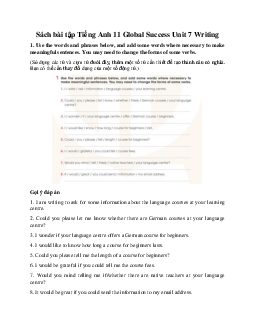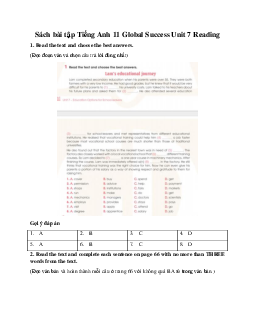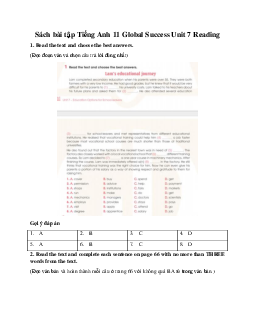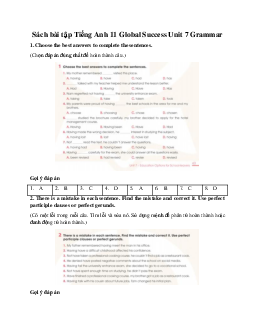







Preview text:
Bài tập Tiếng Anh 11 Global Success Unit 7
Mark the letter A, B, C or D to indicate the word whose underlined part differs
from the other three in pronunciation in each of the following questions 1. A. degree B. doctorate C. graduate D. kindergarten 2. A. culture B. student C. institution D. university 3. A. academic B. apply C. apology D. achieve 4. A. based B. pursued C. applied D. arranged 5. A. modes B. colleges C. distances D. enriches
Mark the letter A, B, C, or D to indicate the word that differs from the other three
in the position of primary stress in each of the following questions. 1. A. biology B. geography C. education D. relationship 2. A. broaden B. provide C. pursue D. succeed 3. A. bachelor B. diploma C. intership D. scholarship 4. A. admission B. history C. nursery D. difference 5. A. studious B. dependent C. critical D. cultural
Mark the letter A, B, C, or D to indicate the word(s) OPPOSITE in meanin the
underlined word(s) in each of the following questions.
1. Students also have the opportunity to choose from a wide range of optional courses in the university. A. mandatory B. selective C. free D. limited
2. We always appreciate feedback from friends, so if you have any questions or
suggestions, please let us know. A. depress B. welcome C. disregard D. consider
3. Tom did miserably on the final test, which caused a shock to everyone in the class. A. took B. sat for C. failed D. passed
Mark the letter A, B, C, or D to indicate the word(s) CLOSEST in meaning to the
underlined word(s) in each of the following questions.
1. If the examiner can't make sense of what your essay is about, you'll get the low mark. A. declare B. estimate C. communicate D. understand
2. Some students only cram for tests when there is little time left, so their results are not satisfactory. A. prepare in a short period C. prepare well D. prepare badly B. prepare in a long time
3. My application for the scholarship has been turned down because the transcript of
marks is not satisfactory enough. A. cancelled B. postponed C. reduced D. rejected
Mark the letter A, B, C, or D to indicate the correct answer to each of the following questions.
1. It is not easy at all to get a good job without any ____ qualifications. A. academic B. social C. great D. favourite
2. My job now is not __________ to what I was majored in at university. A. devoted B. related C. supposed D. belonging
3. In England schooling is compulsory ___________ all children from the age of 5 to 16. A. with B. for C. to D. over
4. If you need to _________ the teacher’s attention, just put up your hand. A. attract B. pay C. take D. pull
5. The functional skills such as fundamentals of agriculture, health and hygiene and
population education have also keen incorporated in the primary school _________. A. curriculum B. project C. plan D. schedule
6. Any pupil caught ____ was made to stand at the front of the class. A. misbehave C. misbehaviour B. misbehaved D. misbehaving
7. Please, don't forget ____ your essays during Friday's lesson. A. hand in C. to hand in B. handing in D. to handing in
8. It's my ____ ceremony next week; I think my parents are looking forward to it more than I am. A. graduation C. graduating B. graduate D. graduates
9. Next year, I have to decide which area of medicine I want to ____ in. A. come C. hand B. focus D. specialise
10. The more ____ you have, the more chance you have of finding a better job. A. courses B. contributions C. qualifications D. qualities
Read the following passage and mark the letter A, B, C, or D to indicate the correct
word or phrase that best fits each of the numbered blanks.
EXAM OR CONTINUOUS ASSESSMENT?
How do you feel when you sit an exam? Do you always succeed in getting all your ideas
down on paper, or do you sometimes feel that you're (1) ____ a mess of it? (2) ____ from
those lucky few who sail through exams, most secondary school pupils find them very
stressful. Many teachers are (3) ____ of the problems their students face and use a
different method for measuring their progress: continuous. With continuous assessment,
students are given (4) ____ tasks to do throughout the year. All their marks are added
together to produce a total mark (5) ____ the end of the year. Students have to (6) ____
more responsibility for their education because they can't rely on doing well on just one
day. Also, they have more time to think over their work, meaning that they are able to do their best. 1. A. doing B. having C. making D. taking 2. A. Apart B. According C. Except D. But 3. A. aware B. intelligent C. recognisable D. knowledgeable 4. A. varitey B. various C. vary D. variably 5. A. at B. on C. in D. from 6. A. do B. get C. make D. take
Read the following passage and mark the letter A, B, C, or D to indicate the correct
answer to each of the questions.
One way of training for your future occupation in Germany is by pursuing a dual
vocational training programme. Such programmes offer plenty of opportunity for on-the-
job training and work experience. Programmes usually last between two and three and a
half years and comprise theoretical as well as practical elements. You will spend one or
two days a week, or several weeks at once, at a vocational school where you will acquire
the theoretical knowledge that you will need in your future occupation. The rest of the
time will be spent at a company. There you get to apply your newly acquired knowledge
in practice, for example by learning to operate machinery. You will get to know what
your company does, learn how it operates and find out if you can see yourself working
there after completing your training.
This combination of theory and practice gives you a real head start into your job: by the
time you have completed your training, you will not only have the required technical
knowledge, but you will also have hands-on experience in your job. There are around 350
officially recognised training programmes in Germany, so chances are good that one of
them will suit your interests and talents. You can find out which one that might be by
visiting one of the jobs and vocational training fairs which are organised in many German
cities at different times in the year.
Employment prospects for students who have completed a dual vocational training
programme are very good. This is one of the reasons why this kind of training is very
popular with young Germans: around two thirds of all students leaving school go on to
start a vocational training programme.
1. Which of the following is probably the best title of the passage?
A. Employment Opportunities and Prospects in Germany
B. Higher Education System in Germany
C. Dual Vocational Training System in Germany
D. Combination of Theory and Practice in Studying in Germany
2. The word "it" in the first paragraph refers to ____. A. company B. machinery C. knowledge D. organisation
3. Which of the following statements best describes the dual vocational training programmes?
A. These programmes consist of an intensive theoretical course of two and a half years at a vocational school.
B. These programmes require you to have only practical working time at a certain company.
C. These programmes offer you some necessary technical skills to do your future job.
D. These programmes provide you with both theoretical knowledge and practical working experience.
4. The word "hands-on” in the second paragraph is closest in meaning to ____. A. theoretical B. practical C. technical D. integral
5. How many German school leavers choose this vocational training programme? A. well over 75% B. around one out of five C. less than a third D. about 70%
Combine the sentences, using perfect gerunds
1. Tonya had dumped a lot of rubbish on the beach. She was strongly criticised for that.
Tonya was strongly criticised for __________________________________________
2. He said that he would take responsibility for the project. But then he denied that.
He denied ____________________________________________________________
3. He didn’t keep his promise. He apologised for that.
He apologised for ______________________________________________________
4. He risked his own life to rescue the little boy. He was really admired for that.
He was really admired for _______________________________________________
5. She raised $20,000 for wildlife protection. She was praised for that.
She was praised for ____________________________________________________ -The end-
Bài tập Tiếng Anh 11 Global Success Unit 7
Mark the letter A, B, C or D to indicate the word whose underlined part differs
from the other three in pronunciation in each of the following questions 1. C 2. A 3. A 4. A 5. A
Mark the letter A, B, C, or D to indicate the word that differs from the other three
in the position of primary stress in each of the following questions. 1. C 2. A 3. B 4. A 5. B
Mark the letter A, B, C, or D to indicate the word(s) OPPOSITE in meanin the
underlined word(s) in each of the following questions. 1. A 2. C 3. D
Mark the letter A, B, C, or D to indicate the word(s) CLOSEST in meaning to the
underlined word(s) in each of the following questions. 1. D 2. A 3. D
Mark the letter A, B, C, or D to indicate the correct answer to each of the following questions. 1. A 2. B 3. B 4. A 5. A 6. D 7. C 8. A 9. D 10. C
Read the following passage and mark the letter A, B, C, or D to indicate the correct
word or phrase that best fits each of the numbered blanks. 1. C 2. A 3. A 4. B 5. A 6. D
Read the following passage and mark the letter A, B, C, or D to indicate the correct
answer to each of the questions. 1. C 2. A 3. D 4. B 5. D
Combine the sentences, using perfect gerunds
1. Tonya was strongly criticised for having dumped a lot of rubbish on the beach.
2. He denied having said that he would take responsibility for the project.
3. He apologised for not having kept his promise.
4. He was really admired for having risked his own life to rescue the little boy.
5. She was praised for having raised $20,000 for wildlife protection.



